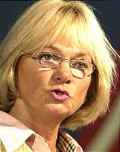 COPENHAGEN, Denmark — Raving xenophobe or fearless defender of Danish values? Nationalist leader Pia Kjaersgaard’s anti-Muslim outbursts have earned her many labels — and many votes.
COPENHAGEN, Denmark — Raving xenophobe or fearless defender of Danish values? Nationalist leader Pia Kjaersgaard’s anti-Muslim outbursts have earned her many labels — and many votes.
Despite predictions of her populist Danish People’s Party’s demise, Kjaersgaard remains a powerful force in domestic politics after winning 14 percent of the vote in last week’s election.
“The most important thing for the Danish People’s Party is to maintain the Danish identity,” Kjaersgaard, 60, told The Associated Press in an interview. “I am convinced that the Islamists want to sneak Sharia (Islamic law) through the back door, that they want to combat Western society and they want Islam to become the main religion,” she said.
Her party — Denmark’s third biggest — has held the role of kingmaker since 2001, giving the center-right government the backing it needs for a majority in Parliament. In return, Kjaersgaard has been able to press the government to adopt some of Europe’s strictest immigration laws, which she says have been instrumental in stemming the inflow of Muslims with radical views.
There are an estimated 200,000 Muslims among Denmark’s 5.4 million residents.
“The individual Muslim has never been a problem for Danish society. But their number has,” Kjaersgaard told AP in her office, decorated with Danish flags and paintings depicting Danish landscapes. To emphasize her point, she said she shops at a grocery store owned by a Turkish Kurd who respects Danish laws and culture. “He has a lot of great stuff — fruits, vegetables — and he’s a good friend of mine,” Kjaersgaard said.
The flow of asylum-seekers has dropped by 84 percent since Denmark tightened its immigration laws in 2001. There is now broad agreement across party lines to maintain the system.
But critics say the Danish People’s Party has polarized Danish society by bashing Islam and stereotyping immigrants as welfare cheats. “She is a scare-mongering populist and opportunist,” said Holger K. Nielsen of the left-wing opposition Socialist People’s Party. He added Kjaersgaard was a skillful politician who has tapped into undercurrents of nationalism and worries over immigration among Danes.
During last year’s uproar over Danish caricatures of the Prophet Muhammad, Kjaersgaard and other leading party members took turns blasting Islam as incompatible with Danish traditions including free speech. Ahead of the Nov. 13 election, one of the party’s campaign posters showed an artist’s hand drawing a picture of Muhammad, with the text “Freedom of speech is Danish, censorship is not.”
Continue reading →

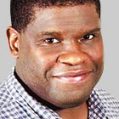 “Over the past year or so the rural Italian idyll of Colle di Val d’Elsa has played host to a bitter battle for Enlightenment values. On one side, the hamlet’s small Muslim community has raised a considerable amount of money to build a large mosque. Having gained the mayor’s approval, the Muslims signed a declaration of cooperation with the town hall and even planted a Christmas tree at the site as a good-will gesture.
“Over the past year or so the rural Italian idyll of Colle di Val d’Elsa has played host to a bitter battle for Enlightenment values. On one side, the hamlet’s small Muslim community has raised a considerable amount of money to build a large mosque. Having gained the mayor’s approval, the Muslims signed a declaration of cooperation with the town hall and even planted a Christmas tree at the site as a good-will gesture. COPENHAGEN, Denmark — Raving xenophobe or fearless defender of Danish values? Nationalist leader Pia Kjaersgaard’s anti-Muslim outbursts have earned her many labels — and many votes.
COPENHAGEN, Denmark — Raving xenophobe or fearless defender of Danish values? Nationalist leader Pia Kjaersgaard’s anti-Muslim outbursts have earned her many labels — and many votes.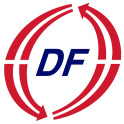 COPENHAGEN — The Danish government’s far-right ally in parliament has made immigration, especially by Muslims, its main target of attacks ahead of next week’s legislative elections. In its election campaign for the November 13 poll, the Danish People’s Party (DPP) blasts Muslim immigrants for not respecting Danish traditions and for taking advantage of the Scandinavian country’s generous welfare system.
COPENHAGEN — The Danish government’s far-right ally in parliament has made immigration, especially by Muslims, its main target of attacks ahead of next week’s legislative elections. In its election campaign for the November 13 poll, the Danish People’s Party (DPP) blasts Muslim immigrants for not respecting Danish traditions and for taking advantage of the Scandinavian country’s generous welfare system.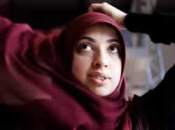 A far-right Danish political party controversially depicted the prophet Muhammad on election material yesterday. Now a high-profile Danish-Muslim politician has hit back with a poster lampooning the move.
A far-right Danish political party controversially depicted the prophet Muhammad on election material yesterday. Now a high-profile Danish-Muslim politician has hit back with a poster lampooning the move.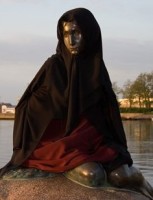 The Little Mermaid statue in Denmark’s capital was found draped in Muslim dress and a head scarf Sunday morning, police said. After receiving a telephone call, officers drove to the site and removed the garments, said Copenhagen police spokesman Jorgen Thomsen.
The Little Mermaid statue in Denmark’s capital was found draped in Muslim dress and a head scarf Sunday morning, police said. After receiving a telephone call, officers drove to the site and removed the garments, said Copenhagen police spokesman Jorgen Thomsen.